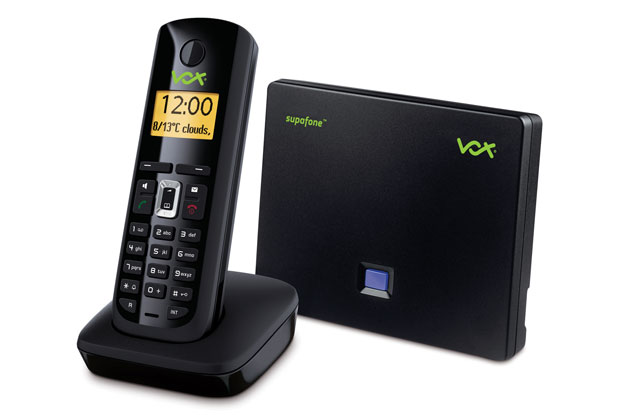
Internet protocol (IP) phones that route calls over users’ broadband connections have been around for several years, but their adoption is surprisingly low in South Africa given the cost savings and even quality they offer over traditional fixed-line telecommunications.
In recent weeks, TechCentral has been testing the Supafone, an IP phone marketed and sold by telecoms service provider Vox Telecom — and the results, over a standard Telkom broadband line, have been outstanding. TechCentral tested the device on a 4Mbit/s line using an uncapped and shaped consumer MWeb account during business hours.
In order to use the Supafone, all users need is a spare port on their digital subscriber line (DSL) router. Vox supplies a cradle for storing and charging the handset and the range of the wireless handset — which is made by Siemens — is in the region of 50m indoors, or 300m outdoors.
The Supafone supports up to six handsets, users can make two IP calls and one Telkom call at the same time, and they can transfer calls between handsets, all of which explains why Vox is targeting small business with the product.
TechCentral reviewed the Supafone’s most basic handset offering, the Siemens Gigaset A58H. The handset includes a speaker, stores the last 10 dialled, missed and received calls, and the battery lasts for days on end, even with heavy use.
What impressed us most about the Supafone was the call quality. There were instances where calls took longer to connect than on a regular landline or mobile phone, but once connected voice call quality was outstanding — far superior to a traditional switched call on Telkom.
Vox offers two basic packages for its Supafone. The first costs R99/month and is subject to a one-year contract and R300 setup fee. This option comes with R50 of talktime per month. The second option is to buy the Supafone outright as a cost of R995, doing away with the need for the monthly subscription fee. It also includes R1 000 of talktime once off and comes with free delivery. This is the better bet for small businesses.
The biggest selling point of the Supafone — aside from call quality — is the cost of calls. Call rates are competitive — they’re outlined in the table below alongside Telkom’s rates. Calls to other Supafone numbers are free. Subscribers are allocated a number in the 087 number range.
Though the Supafone can’t be used to dial emergency numbers, users can hold down the dial button — rather than tapping it — after dialling a number to route the call over Telkom’s network.
Vox claims the Supafone uses 1GB of data for 50 to 60 hours of talktime.
[table id=51 /]
Once users have exhausted their allotted talktime, they’re billed according to the published call rates and receive an e-mailed bill.
People wanting to keep their fixed-line number can port it to Vox for use with the Supafone, but the porting process entails effectively cancelling their number, meaning they have to reapply for their DSL — a process than can take time. Most users would probably be better off keeping their Telkom number and using the Supafone to make outbound calls.
The only time we encountered a problem with the Supafone was when our office DSL went down briefly. Other than that, we didn’t experience any dropped calls and call quality was always exemplary. So, we’re quite perplexed as to why more small businesses haven’t done the same, especially if they still have a Telkom line as backup. — (c) 2013 NewsCentral Media

